We’re approaching the fourth week of Advent, when we light the candle of Love. We’ve already set flame to hope, peace and joy. And perhaps I don’t mean that symbolically: those moments of idealism and resistance are burning up, perhaps burning out, but also lighting a path forward.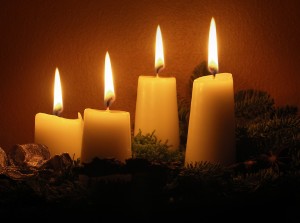
DARKNESS and NIGHT
We live through the long winter and the darkest night, in our hemisphere anyway, just about now. We fill the dark with tiny bright lights. We often push back against the edges of the deep blue-purple-brown-black hues that draw close, sometimes intimidating, sometimes intimate.
Let’s pause and muse on the colors and gifts of darkness and night. Why? Because in a time when we are compelled to remind people that Black Lives Matter and Brown Lives Matter, even references to color and time and place need to be overturned and examined. To be recognized as beautiful and desirable.
This is the season, in the womb of the winter earth, when the seeds planted are dormant and await new life. Something wonderful grows in this darkness, just as babies blossomed in the wombs of two women in Luke 1:39-56 (our Gospel this week). The colors of deep winter and the longest night are the spectrum of the world, from its stellar cradle to its jutting mountains, its shadowed valleys to its briny depths, and its fertile soils to its ripened fruits. Darkness and night aren’t necessarily a place to run from or a state of being to push away and change. These are sites in which to rest and take root and regenerate.
RESISTANCE and RESILIENCE
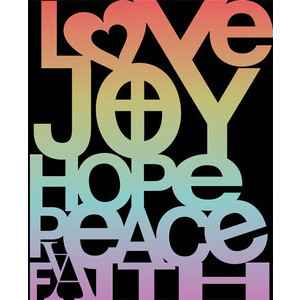 And then there’s the fact that as we set those candles aflame, we are defying the emotions and experiences and events that would snuff out these promises of the season. I’ve already groaned in past blogs, about the state of the world.
And then there’s the fact that as we set those candles aflame, we are defying the emotions and experiences and events that would snuff out these promises of the season. I’ve already groaned in past blogs, about the state of the world.
How hard it may be to access hope in these violent, oppressive, troubling days, from the bigoted and fear-based comments of political candidates to the terror-inducing violence of individuals and groups within our borders and beyond them. What a stretch to imagine peace in any form, from the inner peace challenged by the many directions in which we are constantly tugged by our culture, to the relational peace that we don’t have time to cultivate in our own families and communities, or the international peace that seems beyond possibility as bombs are set off, guns are loosed, lives are taken and nations decimated. As for joy … it seems a small thing in a large and scary world, and can one carol or one peal of laughter change everything?
And yet, as Christians, we are asked to hold vigil through these times. We are called to believe and work toward these promises. In God, all things are possible.
PAGEANTS and FEASTS
So this week, we think about love. And we have many scriptures to consider, but I’ll focus on the Gospel of Luke 1:39-56. This passage stitches together two birth narratives of two men: John the Baptist and Jesus of Nazareth. Yet it is their mothers, carrying these babies-to-be, who do the rejoicing and commiserating and prophesying and singing and praising. One is unwed, poor and far from home, visiting. The other was elderly, considered barren. Neither of them are wealthy or powerful. They are, in their time, just two women … without authority.
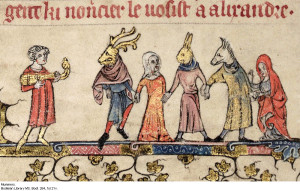 Yet they sing out the good news of what is to come. One commentator, in Feasting on the Word, observed that from Mary’s Song, the Magnificat, grew the medieval Feast of Fools, which poked fun at the church and government, by electing a false Bishop, reading holy books upside down, spouting nonsense words as liturgy, and using orange rinds as spectacles … overturning the order of the world, and putting faith into the hands of the people usually without influence, position, or voice.
Yet they sing out the good news of what is to come. One commentator, in Feasting on the Word, observed that from Mary’s Song, the Magnificat, grew the medieval Feast of Fools, which poked fun at the church and government, by electing a false Bishop, reading holy books upside down, spouting nonsense words as liturgy, and using orange rinds as spectacles … overturning the order of the world, and putting faith into the hands of the people usually without influence, position, or voice.
After all, the Feast of Fools was inspired by a text in which two women prophesy, and become the harbingers of transformation in the world. From their exchange, bellies bulging, babies kicking, women laughing and singing, comes a fleshy, embodied, incarnate promise.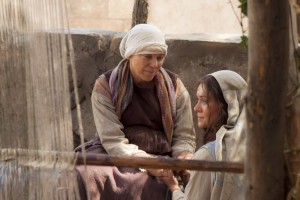
This same commentator says that such text deserves a ridiculous, laughing, flamboyant, raucous and joyful consideration. At Sanctuary, we’ll be joining North Prospect Union UCC church’s congregation for an unrehearsed Christmas pageant this Sunday, Dec 20. You might call it a modern version of the Feast of Fools. Chaos. Without a script. Children and adults taking risks. Having fun. Owning the narrative. And bringing an ancient story to new life.
UNTAMED LOVE
The challenge to approach this week’s text with a light heart, to claim it in an irreverent way, made me think about how we tame our concept of God. We imagine God as someone we can contain within specific hours, or the outline of polite liturgy and readings, and our favorite songs and familiar rites. Yet God (in the person of Jesus) was born messily. He overturned the hopes and expectations of people waiting for a conquering, political warrior Messiah. He grew up among people who couldn’t give him rank or military might or privilege or elite education, and he walked out into a world where he recognized and engaged with those marginalized in their own ways, and invited those in roles of privilege and power into surprising relationships, knitting together different parts of his world in unlikely alliance, and provoking others to extreme reaction.
This messy, wild, loving God won’t be contained. Or appeased by complacency. Or confined to our rules and labels.
This is a God who was born into troubled and violent times. As Jesus, as Messiah, he is invited back into our lives during this season, again into troubled and violent times. Chaos and discomfort are precisely what this God’s arrival cause, and where this God thrives.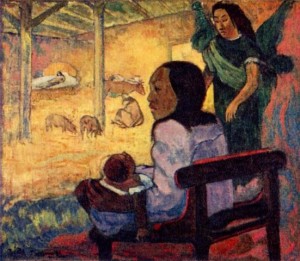
This gentle, laughing, joyous, reckless, defiant, loving God — coming in the person of Jesus — starts out in a place where animals are housed, where fecal matter and straw mingle, where grains and livestock rub up against each other. He lives as a mortal who eats and sweats and thirsts and wearies and bleeds and defecates and walks and weeps. His flesh becomes the landscape on which human failings are striped and stabbed and paid out. He dies and comes back, with the marks of his human journey scored across his hands, feet and side. The one we’re preparing for, as we light each candle and focus on each promise of Advent, is Emmanuel, God With Us.
He’s with us through everything. The joy. The celebration. The groaning and sorrow. The anger and consternation. The resistance, with gentle certitude, toward oppression, injustice, and violence.
HOW DOES SUCH LOVE FIT IN?
So what can we do with the idea of a larger-than-life love that’s about to show up in our midst? As in the Feast of Fools, God’s love comes to turn the world upside-down.
God’s love is subversive and wild, untameable and irresistible. It is a love that makes possible what seems impossible, because God is not only great, God is good. Good to us. And God shows up, and draws near, and loves us in spite of our flaws and failings and sins as mere humans, simply because God loves us. We cannot earn or deserve such grace. God comes to us, precisely because we are broken humans, who need such love. God does for us, what we cannot do for ourselves.
This week we light the candle for Advent: Love. One more light that resists all the events and institutions and systems and beliefs that hurt the world. This candle sends one more cry into the darkness, where life is growing even now, like the baby in a mother’s belly, inviting the arrival of Emmanuel into this place where transformative, unstoppable love is sorely needed.
We should tremble that we dare to light this candle. That we dare to desire this love. It will change us.
Then, I suppose, we ought to go ahead and laugh and take the chance. Set the flame to the wick. Send up the invitation. Admit the expectation.
Let love come.

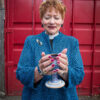



I would like to quote this beautiful essay in our Dec 23rd bulletin. Can you tell me who the author is?